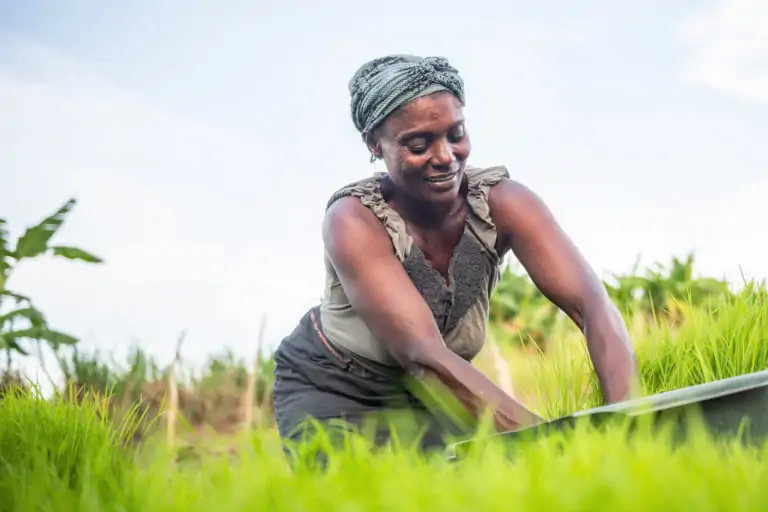Women play a foundational role in Kenyan agriculture and agribusiness. With an estimated 80% of the agricultural labour force being female, they have become essential to ensuring food security at household and national levels, as well as contributing to the country’s economic growth.
However, despite their significant participation, Kenyan women face many disparities and inequalities related to their gender. This includes limited access to productive resources, such as land, credit, and technology, and an underrepresentation in leadership and decision-making positions within the sector.
This article explores these challenges and discusses strategies for overcoming them and promoting Kenyan women’s empowerment.
Barriers to women’s success in Kenyan agribusiness
Land and property rights
One of the most significant barriers facing women in Kenya’s agriculture sector is limited access to land and property rights. Although laws and policies like the Constitution of Kenya, the Matrimonial Property Act, Law of Succession (Amendment) 2021, and the National Land Policy adopted in 2009 reinforce women’s land rights, implementation has been restricted by deeply entrenched societal norms and traditional practices that position men as the custodians of land. Very few women have their land fully registered in their names, and many face strong resistance from men when attempting to push for joint land ownership.
Cultural institutions in Kenya remain unfairly skewed against women. Land registration and tenure systems favour men, with families often distributing family land among the sons only. This systemic exclusion of women from land ownership perpetuates their low economic status and hinders women’s ability to invest in and benefit from agricultural activities.
Discriminatory social norms also limit women’s agency and decision-making power in relation to land. Women are often left out of key decisions around land allocation, use and sale. In addition to this, women are often underrepresented in leadership positions within agricultural cooperatives, associations, and other key decision-making bodies. This lack of representation limits their ability to influence policies and practices that affect their participation and success in agriculture. Addressing these systems and practices is crucial to realising women’s land rights and unlocking their potential.
Education and training opportunities
Additionally, women in Kenya face unequal access to education and training opportunities. Despite progress in recent years, gender gaps in education persist, particularly in rural areas where traditional gender roles and expectations often prioritise boys’ education over girls’. In rural Kenya, only 18% of Kenyan women have completed secondary education, with approximately 49% of the female youth (15-24) population considered illiterate.
The situation is particularly present in rural areas, where only 14% of girls enrol in secondary education. Poverty, teenage pregnancies, early marriages, and lack of mentorship contribute to high dropout rates among girls. Kenya has one of the highest teen pregnancy rates in the world with approximately 25% of Kenyan women giving birth by age 18 and nearly 50% by age 20.
Even when women do have access to education, they often face additional barriers in accessing agricultural extension services and training opportunities. These services, which provide crucial information on improving farming practices, new technologies, and market opportunities, are often targeted towards men, who are seen as the primary decision-makers in agriculture.
This unequal access to education and training means that women often lack the technical knowledge and skills needed to improve their agricultural productivity, access new markets, and make informed business decisions. Without these critical skills, women struggle to compete in an increasingly complex and competitive environment. Addressing these gender gaps in education and agricultural extension services is therefore crucial to unlocking women’s full potential in agribusiness and promoting more equitable and sustainable development in Kenya.
Domestic burden
Women in Kenya bear a disproportionate burden of domestic and care work, which significantly impacts their ability to engage in other activities. The time and energy spent on unpaid household tasks, leave women with limited time and resources to invest in their agribusiness ventures. This time poverty, coupled with the lack of recognition and valuation of women’s unpaid work, perpetuates gender inequalities in the sector. Furthermore, the timing and location of agricultural training sessions often fails to take into account women’s multiple roles and responsibilities, making it difficult for them to attend.
Strategies for overcoming barriers and empowering women
A holistic, multi-pronged approach addressing women’s access to resources, agency and the institutional structures that shape their choices is key to empowering Kenyan women. Only by implementing legal and policy reforms, improving education and training access, promoting women’s leadership, transforming gender norms, developing gender-responsive programs, and leveraging women’s groups and networks can we create an enabling environment that supports their full participation and success in agribusiness.
Legal and policy reforms
Legal and policy reforms are essential to overcoming barriers and empowering women in agribusiness. Key measures include strengthening women’s land rights and tenure security through legal reforms that ensure equal rights to own, inherit, and control land, and enforcing gender-responsive land and property laws. Additionally, promoting policies that remove discriminatory practices, protect women’s rights, and enable their full participation in economic, social, and political life is crucial. Implementing policies that improve women’s access to credit, extension services, and markets can help level the playing field, as can ensuring women’s adequate representation and voice in policy formulation processes.
Access to education and training
Improving access to education and training is another key strategy. Promoting girls’ education and women’s literacy, as well as providing gender-sensitive agricultural training, can equip women with the knowledge and skills they need to thrive in agribusiness. Additionally, promoting women’s leadership and decision-making is essential.
Women’s leadership and collective action:
Promoting women’s leadership and collective action can help build their agency and amplify their voice. This means encouraging women’s active participation and leadership in farmer groups, cooperatives, producer associations and rural organisations. Affirmative action measures like quotas for women in leadership positions can also catalyse this process.
Transforming gender norms and relations:
Awareness campaigns and community dialogues that challenge perceptions about gender roles and promote more equitable sharing of domestic responsibilities and decision-making is key. Engaging men as partners and champions in this process is of strategic benefit. Positive messaging recognising and valuing women’s contributions in agriculture and the economy, amplified through media, success stories, and role models, can accelerate mindset change. Promoting labour and time-saving technologies to reduce women’s domestic workload and enable their productive participation is another key strategy.
Gender-responsive programs and investment
Creating and implementing gender-responsive agricultural programs and intentionally investing in women is crucial for achieving equitable and sustainable development in Kenya’s agricultural sector. This requires applying a gender lens to the design, implementation and evaluation of all agricultural programs. Setting clear gender equality targets and collecting sex-disaggregated data to measure progress is essential to measure progress and address disparities effectively. Resources and budgets should also be earmarked specifically for women farmers and entrepreneurs.
Women’s groups and networks
Harnessing the power of collective action through women’s groups and networks is vital for empowering Kenyan women in agribusiness. These groups provide a unified voice that strengthens women’s influence and bargaining power within the sector. They promote peer learning, where women can share experiences and knowledge, enhance their skills and improve their understanding of agribusiness practices.
These groups can serve as platforms for advocacy, where women can collectively address common issues and champion their rights and interests. Additionally, mentorship programs within these networks allow experienced agripreneurs to guide newcomers and provide valuable support and advice.
Empowering women in agribusiness
Empowering women in agribusiness is crucial to achieving equitable and sustainable development in the agricultural sector and creating a more inclusive and thriving agribusiness ecosystem in Kenya.
Policymakers, development organisations, and agribusiness stakeholders ought to prioritise women’s empowerment and gender equality in their strategies and interventions. This requires a concerted effort to reform policies and practices, provide gender-responsive support services, and challenge the social norms and attitudes that perpetuate gender inequalities.
By working together to overcome barriers and create an enabling environment for women in agribusiness, we can build a more equitable and prosperous future for Kenya’s agribusiness sector and the nation as a whole.












